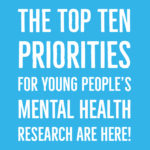
In her debut blog, Linda Kaye summarises a paper that presents a youth mental health research priority setting exercise, which finds that research should be focussing on screen use not screen time.
[read the full story...]
In her debut blog, Linda Kaye summarises a paper that presents a youth mental health research priority setting exercise, which finds that research should be focussing on screen use not screen time.
[read the full story...]
Lucy Bowes explores a multi-polygenic score approach to identifying individual vulnerabilities associated with the risk of bullying, which suggests that depression, ADHD, risk taking, BMI and intelligence are independently associated with exposure to bullying.
[read the full story...]
Pooky Knightsmith summarises and discusses a brand new report from the McPin Foundation, which presents research priorities for children and young people’s mental health.
[read the full story...]
Noortje Uphoff writes her debut elf blog on a recent paper in The Lancet, which looks at what works in inclusion health; providing an overview of effective interventions for marginalised and excluded populations.
[read the full story...]
Alison Turner summarises the Department of Health’s Future in Mind report, which builds on the work of the Children & Young People’s Mental Health Taskforce and sets out a vision for increased coordination and collaboration to improve mental health and wellbeing in children and young people.
[read the full story...]
Background This document provides guidance for people working to prevent and reduce the risk of abuse and neglect of adults. It is aimed at NHS staff and their partners in education and social care and has been developed in partnership with the Department of Health, the Department of Education, the NHS and the social care [read the full story…]